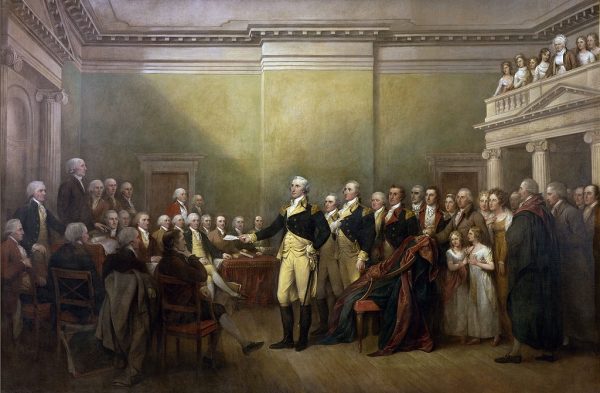History sustains us when our ties to one another become frayed.
Comments on the State of American History

Self-criticism, Progressivism, and post-modernism.
The story of most human societies has followed a more-or-less predictable pattern. It is the pattern of tribes, sometimes of tribes establishing control of others by war or subversion, or of tribes breaking free of that control, and in both cases led by a charismatic leader whose reward is godlike power over all. These tribes identify themselves by language or ethnicity or soil. But their story is mostly the same—us, not them…power, not liberty…stasis, not transformation.
Two hundred and forty-four years ago, from the intellectual milieu of the 18th-century Enlightenment, one new nation broke with this pattern, identifying itself by the natural and inalienable rights of all men, as received, not from some legendary leader, but from the Almighty Creator himself. Eleven years later, this nation wrote a republican instrument of government that turned all its attention to how best those rights could be secured. In a world of empires and monarchs and serfs, where men were born as an atom of dust and women as a straw in the wind, the American republic would bid the atom of dust become a man, the straw in the wind a woman, and both were set free to make of themselves whatever they wished or dreamed or struggled to be.
Yet, this new republic has had its enemies: first, the monarchs, who were amused and then alarmed by it, then the Romantic ideologues who found replacements for the comforting embrace of tribe in the lethal embrace of class and race. Through these challenges, our best protection has come through our history—through the remembrance of a great soldier who laid down his commission rather than seize power…of a shrewd lawyer whose hand freed slaves and wiped out the republic’s ugliest birth-mark…of an enslaved man who lived to be the greatest example, and greatest preacher, of self-made men…of an actor who bade the walls of tyrants come tumbling down.
In truth, history has been our only protection, for we have no ethnicity, no tribe to fall back upon—only our vivid dedication to an Enlightenment ideal, “stretching from every battlefield and patriot grave to every living heart and hearthstone.” But our history is not in good health. Sometimes, its illness is one of neglect. In our anxiety for dominance in science and technology, history has been nudged aside, so that in 2014 the National Assessment of Educational Progress showed that only 18% of American eighth-graders could be considered proficient in U.S. history, while fully one-third do not know when the Civil War occurred, and 40% could not identify the words of the Gettysburg Address with Abraham Lincoln.
Sometimes, however, our history’s eclipse has more malign sources, in those whose ideology leads them to cast the American experiment in as grim a shade as possible, so that the way can be made over the ruins of the republic for some imagined new order which, in the end, turns out to be only a new tribalism. Pick up the newest issues of our flagship historical quarterlies, and their contents will often be an unrelieved witches’ sabbath of condemnation of the American past and the improbability of an American future—of a Revolution concocted to defend slavery, of capitalism which is coterminous with bondage—with truth at the mercy of narrative, and never a thought to whether this will build up rather than tear down the souls of its readers.
How have we come to this pass, especially in the groves of higher education, where American knowledge and resources are supposed to be without peer? The answer is complex, and lies mostly in three parts:
- Self-criticism. It was one of the gifts of the Enlightenment to American thinkers that truth was understood to be the primary target of our intellectual energies, whether the truth of physical nature (as in Galileo and Newton) or of social nature (as in Locke and Montesquieu). But since truth lies outside human manipulation, we are constantly impelled to check ourselves—and this includes our history writing—to be sure that ideological intoxication has not betrayed us into falsehood. This is, in one sense, a necessary function of humility; in another sense, it makes us quick to see and criticize the faults in our past whenever past events have strayed from the pursuit of truth. Hence, American historians are hard-wired to detect that which departs from the natural order described by the founders. But, as James Madison countered in Federalist #14, “If their works betray imperfections, we wonder at the fewness of them.” This penchant for self-criticism, however, is a modest source of our history-writing dilemmas, and lies far from the deeper difficulty posed by…
- Progressivism, and its philosophical crucible, pragmatism. Professional historians, like other academics, are members of a guild, and the dictates of that guild can be shaped by intellectual dictates from sources other than our own. For more than a century after the American Founding, American historians (from David Ramsay and Mercy Otis Warren of the revolutionary generation to George Bancroft in the 1860s) treated American history as the celebration of a novus ordo seclorum, an exceptional nation unlike any preceding it. “Oh, My countrymen, never was a land blessed of heaven like ours,” Bancroft wrote, “My countrymen, we are Americans. The arts and sciences of Europe cannot make us forget it.” But the hideous costs of the American Civil War, and its less-than-satisfying conclusion in Reconstruction, disenchanted many Americans. William James and fellow Harvardian Charles Sanders Peirce treated the Civil War’s rallying cries as disappointing abstractions, and turned instead to favor pragmatic solutions—doctrines of what James called “relief.” What this produced politically was Progressivism: a turn away from dedication to “the proposition that all men are created equal” and toward the application of professional expertise in government management of social problems. American historians who drank from the Progressive fountain read this disenchantment back into American history, producing in the example of Charles and Mary Beard a reinterpretation of American history which saw all events as a cover for class interests, whether those events were the Constitutional Convention or the Civil War. What the Progressive historians found most to regret in American history were those moments when expertise was sacrificed to ideals by a “blundering generation”—which was their way of describing the generation of the Civil War years.
- Post-modernism and the rise of critical theory. Marxism, whether as political theory or as historical description, never made a successful assault on American self-confidence, but it did make an entrance via the back-door of post-modernism and the varieties of so-called “critical theory” which emerged from it. The failures of Marxism in the 20th century led to a widespread questioning of all “meta-narratives” (including Marx’s dialectical materialism), a vast skepticism toward evidence-seeking, a willingness to entertain subjective beliefs whether or not they represented truth or falsity, and an obsession with discourse and language. This post-modern mistrust included not merely Marxist materialism, but all attempts by reason to describe the universe. “Things themselves become so burdened with attributes, signs and allusions,” wrote the genius of post-modern history-writing, Michel Foucault, “that they finally lose their own form. Meaning is no longer read in an immediate perception, the figure no longer speaks for itself.” Science, history, the arts and even mathematics were reduced to mere “discourses” whose only goal was the reinforcement of otherwise invisible power structures. Especially in the form of critical race theory, history-writing was mere narrative, designed for the domination of subordinated races, and to be combatted by counter-narratives, without serious recourse to historical evidence—since appeal to evidence itself was a mere narrative, cunningly devised to assist in the social construction of white supremacy.
The ideologues are not unwise in crafting a strategy which tells us that our history is a balloon, sent aloft to decoy us from the tracks of the powerful. If we wish to imperil the American experiment, we can find few more sinister paths to that peril than by forgetting, obscuring or demeaning who we were, for that will tell the story of who we are, and who we will become. History is not merely a trotline of metaphors, to be analyzed purely as a construct of language. It is not a novel; it is about specific people in specific places within specific events, and to treat it otherwise is to entertain nonsense and to invite the production of despair and discouragement.
But our energies cannot be consumed in merely pulling-down the pullers-down. “Fellow citizens,” said Abraham Lincoln in 1862, “We cannot escape history. We of this Congress and this administration will be remembered in spite of ourselves…. We must think anew and act anew, and then we shall save our country.” Like Nehemiah of old, we must weep for the memory of a city in ruins, but we must also be those who say, as in Nehemiah’s time, “Let us rise up and build” again.
The American Mind presents a range of perspectives. Views are writers’ own and do not necessarily represent those of The Claremont Institute.
The American Mind is a publication of the Claremont Institute, a non-profit 501(c)(3) organization, dedicated to restoring the principles of the American Founding to their rightful, preeminent authority in our national life. Interested in supporting our work? Gifts to the Claremont Institute are tax-deductible.
America's young people are miserable and angry. Universities are to blame.
The 1619 Project isn't the only curriculum turning students against America.
Our heroes will never be forgotten.
Revisionism disrespects students and undermines our regime.
Who controls the past, controls the future.






